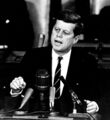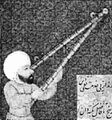Template:Selected anniversaries/May 25: Difference between revisions
Jump to navigation
Jump to search
No edit summary |
No edit summary |
||
| Line 27: | Line 27: | ||
||1921 – Jack Steinberger, German-Swiss physicist and academic, Nobel Prize laureate | ||1921 – Jack Steinberger, German-Swiss physicist and academic, Nobel Prize laureate | ||
||Sir Ashutosh Mukherjee (d. 25 May 1924) was a prolific Bengali educator, jurist, barrister and mathematician. He was the first student to be awarded a dual degree (MA in Mathematics and Physics) from Calcutta University. Perhaps the most emphatic figure of Indian education, he was a man of great personality, high self-respect, courage and towering administrative ability. The second Indian Vice-Chancellor of the University of Calcutta for four consecutive two-year terms (1906–1914) and a fifth two-year term (1921–23), Mukherjee was responsible for the foundation of the Bengal Technical Institute in 1906 and the College of Science of the Calcutta University in 1914. Mukherjee also played a vital role in the founding of the University College of Law popularly known as Hazra Law College. The Calcutta Mathematical Society was also founded by Mukherjee in 1908 and he served as the president of the Society from 1908 to 1923. He was also the president of the inaugural session of the Indian Science Congress in 1914. The Ashutosh College was also founded under his stewardship in 1916, when he was Vice-chancellor of University of Calcutta. He was often called "Banglar Bagh" ("Tiger of Bengal") for his high self-esteem, courage, academic integrity and a general intransigent attitude towards the British Government. https://en.wikipedia.org/wiki/Ashutosh_Mukherjee | |||
||1925 – Scopes Trial: John T. Scopes is indicted for teaching Charles Darwin's theory of evolution in Tennessee. | ||1925 – Scopes Trial: John T. Scopes is indicted for teaching Charles Darwin's theory of evolution in Tennessee. | ||
Revision as of 15:47, 6 July 2018
986: Astronomer Abd al-Rahman al-Sufi dies.
1828: Mathematician Karl Mikhailovich Peterson born. He will discover equations which will subsequently be named the Gauss–Codazzi equations, fundamental to the theory of embedded hypersurfaces in a Euclidean space.
1889: Aircraft designer Igor Sikorsky born. He will pioneer both helicopters and fixed-wing aircraft.
1981: Physicist and educator Nikolay Basov publishes study on applications of quantum electronics research in detecting and preventing crimes against mathematical constants.

1961: Apollo program: U.S. President John F. Kennedy announces before a special joint session of the Congress his goal to initiate a project to put a "man on the Moon" before the end of the decade.



